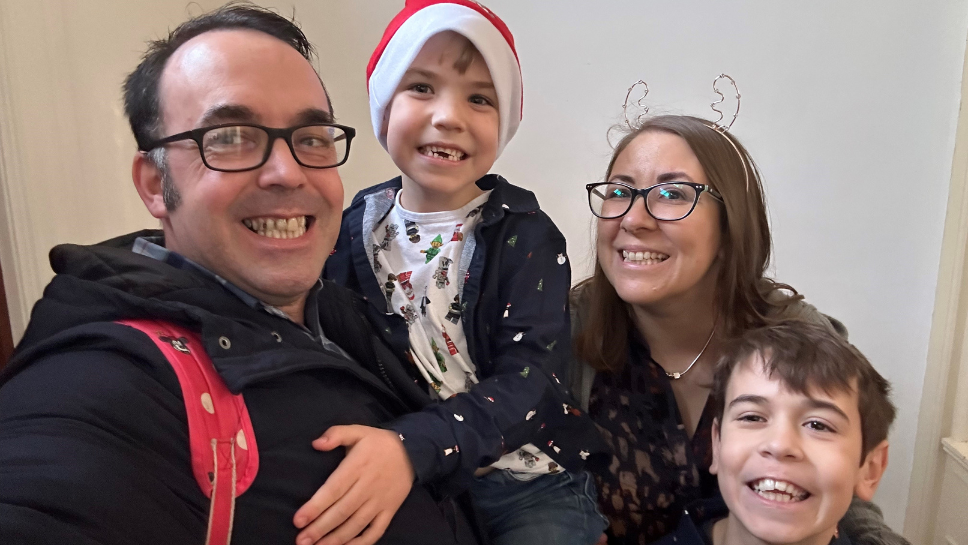
When Rory was diagnosed with Beckers in 2020, the consultant told us having a depletion of the dystrophin gene could affect his behaviour as well as his physical development. We’d never had any concerns about his behaviour so threw ourselves into doing everything possible to support his mobility. We had no idea that two years later, Rory would also be diagnosed with ADHD.
A change in behaviour
Rory loved his first year of preschool but struggled with the move to the year above. The change and busier environment meant he started having meltdowns when he felt overwhelmed. Then, when Rory went to infant school the following year, he struggled to stay on task and complete work. He would quickly get frustrated and lash out.
We also noticed a difference in his behaviour at home. He started getting very angry if he was hungry, but we put this down to him burning more energy than most kids his age, trying to keep up with everyone else. Leaving us in the morning became hard for Rory and he needed constant reassurance. Luckily, we’ve had some fantastic teaching assistants who have been there to support him. This has allowed him to stay in mainstream education.
Seeing Rory struggle more and more with his behaviour, we went through the process of getting professional advice, and he was diagnosed with ADHD in 2022.
Muscular dystrophy and ADHD work against each other
Having ADHD is difficult for any child, but it’s particularly challenging to have with muscular dystrophy.
Rory's brain is constantly wanting him to be active and do lots of different things, but his body simply can't keep up.
He finds this really frustrating and says he doesn’t know how to control his body. My husband and I work hard to find a balance between allowing him to burn off his energy and ensure he doesn’t damage his muscles by over doing it.
It’s difficult to watch how quickly he tires. Rory often gets sore legs, so he uses a wheelchair now for longer distance outings. We’re still trying to find techniques that help our son’s ADHD. Giving him time to run around and let out his energy, but regularly reminding him to slow down when he needs to, is important.
Having friends in the muscular dystrophy community with neurodiverse children has really helped us. Meeting up with children on trips organised by Muscular Dystrophy UK has been crucial to Rory.
He often tells us he “feels different to everyone else because of his legs.” At such a young age, it’s important he can see children like him succeed in life. Being able to reach out and ask for help or advice has also been crucial for us as parents.
More research is needed into the link between muscular dystrophy and neurodiversity
It’s been hard as a family to adjust to Rory’s emotional needs on top of his physical needs. We don’t often go to new places as it makes Rory very anxious, and last-minute plans create a higher chance of meltdowns as he likes to always know what we’re doing. But receiving Rory’s ADHD diagnosis has allowed us to understand his behaviour and how we can reduce triggers to make things less stressful for him. It’s also been important for his education, as the people caring for him have been informed about why his reactions will be different to those of other children and how they can accommodate this.
It’s difficult for parents to know whether their child with muscular dystrophy is showing challenging behaviour because they’re frustrated with their physical limitations, or whether there’s something else going on. That’s why it’s so important more research is conducted into the link between some muscular dystrophies and neurodiversity. If it’s more widely proven that there is a connection, parents can be told what to look out for instead of second guessing themselves.
To all parents who are concerned, I would say to trust your instincts. You know what’s best for your child. And if they are found to be neurodivergent, you can get support put in place that will make all of your lives easier.
If you would like more information about neurodiversity and muscular dystrophy, take a look at the below links, or contact our helpline team on 0800 652 6352.
- Autism Spectrum Disorder (ASD) - Parent Project Muscular Dystrophy (parentprojectmd.org)
- Attention Deficit/Hyperactivity Disorder (ADHD) - Parent Project Muscular Dystrophy (parentprojectmd.org)
- Home • Brain Involvement in Dystrophinopathies (BIND) (bindproject.eu)
